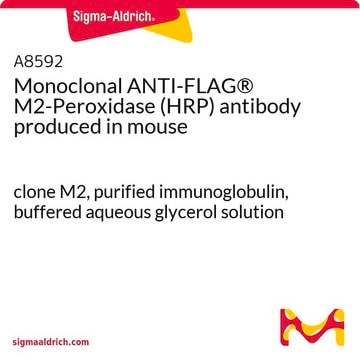V2260
Monoclonal Anti-V5-Peroxidase antibody produced in mouse
clone V5-10, purified immunoglobulin, lyophilized powder
Synonym(s):
Monoclonal Anti-V5
About This Item
Recommended Products
biological source
mouse
Quality Level
conjugate
peroxidase conjugate
antibody form
purified immunoglobulin
antibody product type
primary antibodies
clone
V5-10, monoclonal
form
lyophilized powder
packaging
vial of 0.5 mL
concentration
5-11 mg/mL
technique(s)
western blot: 1:4,000-1:8,000
storage temp.
2-8°C
Looking for similar products? Visit Product Comparison Guide
General description
Specificity
Application
Physical form
Preparation Note
Not finding the right product?
Try our Product Selector Tool.
Signal Word
Warning
Hazard Statements
Precautionary Statements
Hazard Classifications
Skin Sens. 1
Storage Class Code
12 - Non Combustible Liquids
WGK
WGK 2
Flash Point(F)
Not applicable
Flash Point(C)
Not applicable
Certificates of Analysis (COA)
Search for Certificates of Analysis (COA) by entering the products Lot/Batch Number. Lot and Batch Numbers can be found on a product’s label following the words ‘Lot’ or ‘Batch’.
Already Own This Product?
Find documentation for the products that you have recently purchased in the Document Library.
Our team of scientists has experience in all areas of research including Life Science, Material Science, Chemical Synthesis, Chromatography, Analytical and many others.
Contact Technical Service









